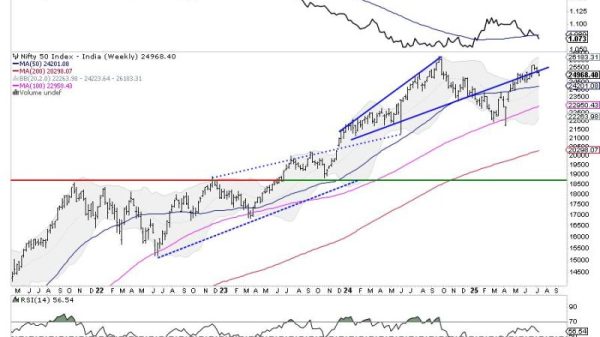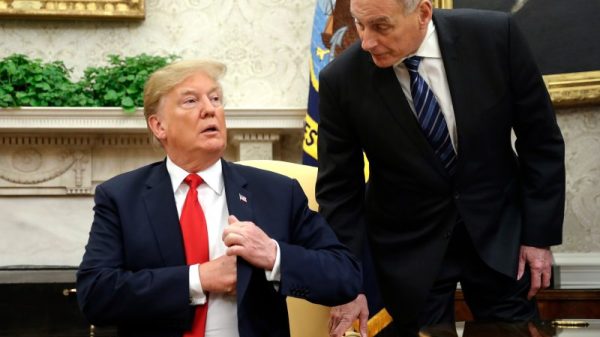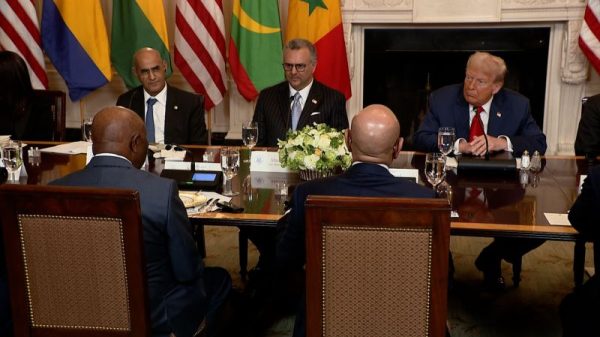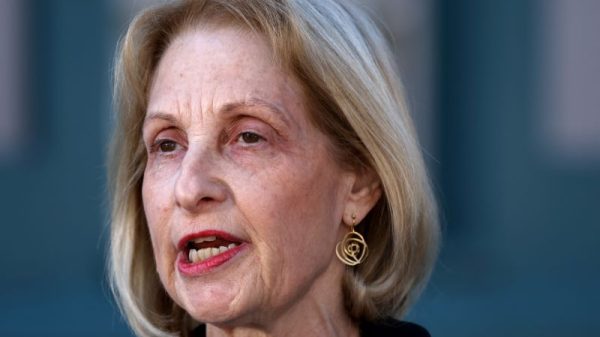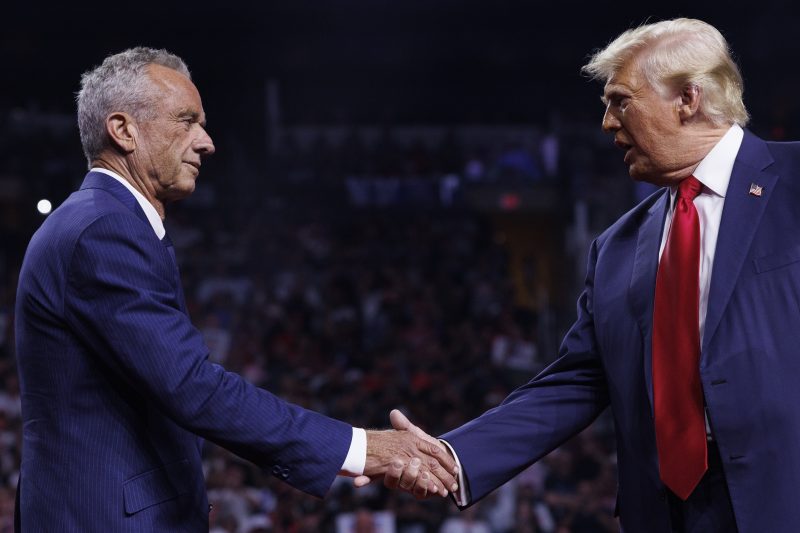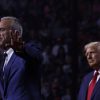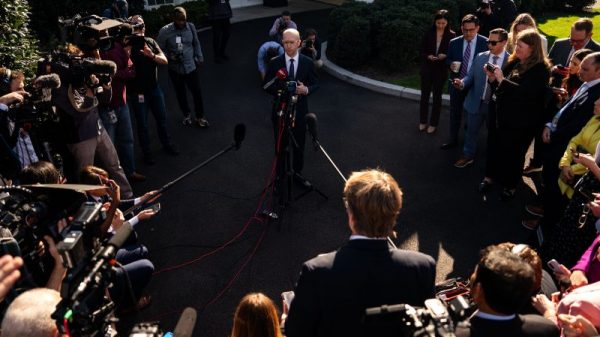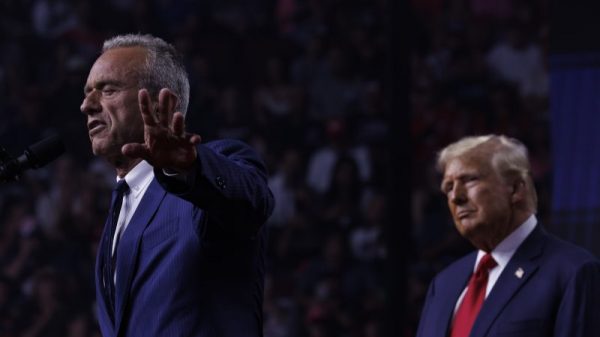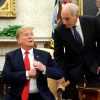Robert F. Kennedy Jr., a former environmental activist who ran in the Democratic presidential primary before launching his independent bid and ultimately dropped out to endorse the Republican nominee, has joined forces with former president Donald Trump as an honorary co-chair of his presidential transition team.
The newly forged alliance raises questions about where they align on policy as well as personality, and whether Kennedy’s supporters will back the Republican nominee following their bitter rivalry and contrasting platforms.
On the campaign trail, Kennedy and Trump often traded insults at one another, with personal attacks escalating earlier this year as some polls suggested that Kennedy’s campaign could siphon votes from both Trump and President Joe Biden. Kennedy called Trump a “terrible president” on a podcast just last month, and has ridiculed his policies. Trump meanwhile has repeatedly sought to portray the third-party candidate as a liberal extremist — calling him a “Democratic plant” and a “lunatic.”
Here’s where they may differ on policy.
1. The environment and energy
Kennedy built his career as an environmental lawyer and activist, suing companies to clean up their polluting practices and leading a nonprofit focused on protecting clean waters. Trump, by contrast, has repeatedly called climate change a “hoax” and turned the phrase, “Drill, baby, drill,” into a campaign slogan.
While in office, Trump withdrew the United States from the Paris climate agreement, and his administration rolled back more than 125 environmental safeguards. During a dinner with the country’s top oil executives earlier this year he vowed to immediately reverse dozens of Biden’s environmental rules and policies and stop new ones from being enacted.
“If I were in the offshore wind industry, I would probably be pretty, pretty nervous,” Trump told executives at the dinner. He also claimed that the renewable-energy source is unreliable, unattractive and bad for the environment, and has said he wants to expand domestic oil production.
Kennedy has stood with protesters to block the construction of oil pipelines and criticized the country’s reliance on fossil fuels. His platform proposed allowing Americans to sell energy back to the grid from solar panels and wind and geothermal sources on their land. In 2023, he supported a ban on fracking as part of his plan to combat plastic pollution, but walked back his position days later.
“My position on fracking is that fracking should have to internalize its own costs,” Kennedy said in an interview on CNBC in February 2024. “… So what I say is it’s not an outright ban on it, but let’s make them pay, internalize their costs.”
2. Coronavirus vaccines
Kennedy is an outspoken vaccine critic who has questioned their efficacy and expressed opposition to vaccine mandates. Trump has also tweeted anti-vaccine rhetoric, and has spread the unfounded claim that vaccines are linked to autism in children.
But there is some apparent agreement on vaccines in schools. Kennedy has fought against schools mandating them, and Trump has said repeatedly on the campaign trail he would cut funding for schools that do.
However, in the midst of the coronavirus pandemic, Trump encouraged Americans to get vaccinated against the virus and repeatedly touted the success of “Operation Warp Speed” — a Trump-era program that aimed to speed up coronavirus vaccine development in 2020.
At a Dallas event in December 2021, after he left office, Trump revealed to a crowd of supporters that he had gotten a booster covid shot and was immediately booed.
“If you don’t want to take it, you shouldn’t be forced to take it. No mandates,” Trump said. “But take credit, because we saved tens of millions of lives.”
Kennedy’s anti-vaccine group, Children’s Health Defense, unsuccessfully brought forward legal action challenging the Food and Drug Administration’s emergency authorization of coronavirus vaccines in December 2020, while Trump was still president. Kennedy has also been critical of Operation Warp Speed and criticized both Trump and Biden for lockdowns during the pandemic, saying in an interview last month that “both of them ravaged American democracy and the republic.”
3. Raising the minimum wage
Trump has held mixed opinions on raising the minimum wage. As a candidate in 2015 and 2016, Trump said in interviews he opposed the hike but later said he was open to raising the federal minimum wage. By August 2016, his campaign had claimed that Trump supported a federal minimum wage increase to $10 an hour, but that states should set their own minimum wage as appropriate.
During a debate against Biden in 2020, Trump initially said minimum wage hikes are an issue that should be left to states to decide, but when pressed by the moderator on the issue, he later said he would consider raising the federal minimum wage.
“He said we have to help our small businesses by raising the minimum wage — that’s not helping,” Trump said of Biden, who committed to a $15 per hour minimum wage, at the time. “I think it should be a state option. Alabama is different than New York. New York is different from Vermont. Every state is different.”
Kennedy campaigned on raising the minimum wage to $15 an hour, saying it “will raise the floor on all wages and return a share of productivity growth back to workers.”
4. Student loans
Amid the pandemic in March 2020, the Trump administration temporarily waived interest on federal student loans and allowed student loan borrowers to suspend their payments altogether. The former president and his running mate, Sen. JD Vance (R-Ohio), have opposed the Biden administration’s efforts to cancel student debt.
Kennedy campaigned to “make student debt dischargeable in bankruptcy and cut interest rates on student loans to zero.”
“Funding higher education is not an entitlement program, it is an investment in America’s future, just as with infrastructure and environment,” Kennedy said on X after Biden’s student loan forgiveness plan was struck down by the Supreme Court. “Let’s invest in America’s young people instead of in the forever wars.”
As a candidate in 2016, Trump supported capping student loan repayments based on income and forgiving loans after payments were made for 15 years, but Trump’s student loan plan for 2024 remains unclear. Trump’s current policy platform does not provide details to address existing student debt.
At a rally in Wisconsin in June, Trump said “students aren’t buying” Biden’s debt forgiveness plan, adding that the president had been “rebuked” by the court system over the plan “and then he did it again.”
5. Abortion and child care
Kennedy and Trump have nuanced views on both abortion access and the role of the federal government to assist with child care.
Trump celebrated the Supreme Court’s decision in 2022 to overturn Roe v. Wade, which gave individual states the power to decide on whether to provide abortions, and called it “a great victory” but the former president has been vague on his abortion position since then.
Earlier this year he announced that abortion should be decided by the states and that he supports exceptions to abortion bans for rape, incest and the life of the mother. Before that, Trump once floated a 15- and 16-week national ban on abortion.
But in an interview with the Daily Mail on Thursday, Trump said Florida’s six-week ban on abortion (which went into effect earlier this year) was too short, and that he wanted “more than six weeks.” Afterward, Trump’s campaign sought to position him in a neutral way with regard to the ballot measure.
Kennedy, who sent mixed signals about his position on abortion during the campaign, had previously said that he thought abortion should be allowed at full term, but he later reversed his position after blowback from conservative supporters and he said he supported abortion until “the baby is viable outside the womb.”
Both Kennedy and Trump have supported increasing the child tax credit, but Trump has not directly stated how he would ease child care costs. During the June presidential debate, Trump declined to answer what he would do to make child care more affordable, instead pivoting to respond to Biden’s criticism about his alleged insults against servicemembers killed in action.
While Trump was president, he signed legislation in 2018 that provided a major increase in child-care block grants to states and has highlighted an increase in the child tax credit that took place in 2017. Trump’s 2024 platform states that Republicans want to make the expanded child tax credit permanent.








